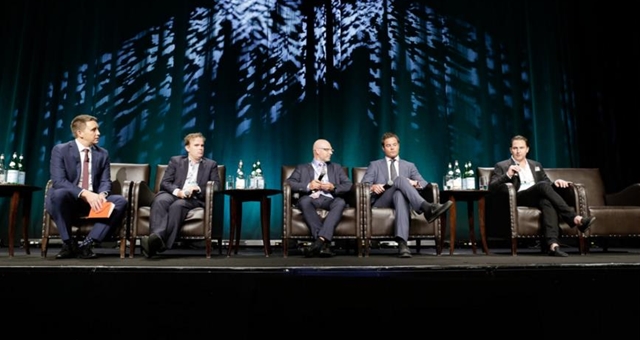By Emma Gardiner
Day two of the 2016 Australasian Hotel Industry Conference and Exhibition (AHICE) kicked off with a Quest Apartment Hotels Franchising Breakfast Seminar that attracted a large crowd interested to hear the latest developments from one of the nation’s fastest growing companies.
The program for the day did not lose pace and forged straight into a leadership Q&A with IHG’s Karin Sheppard, followed by the entertainingly cagey Meet the Press session hosted by Peter Hook, where leading journalists from the Australian Financial Review, The Sydney Morning Herald and HM quizzed Hilton’s Paul Hutton, Mantra’s Bob East and Quest’s Zed Sanjana.
As a large crowd started to build (over 750 attended AHICE in 2016), a panel made up of boutique hoteliers from Peppers, Art Series, QT and Lancemore then discussed the opportunity that this kind of property presents in terms of brand standard flexibility and individualisation.
Will Deague from Art Series told the audience that when the company launched their SmartCars for guests initiative, they helicoptered a SmartCar down the Yarra as a key marketing stunt.
Quest CEO Sanjana revealed that the company will be making a concerted push into the UK market in the coming year, saying that the laws are friendly to both franchisees and leaseholders. He said the UK currently sits at six per cent market share of serviced apartment accommodation and believes there is room to move it up to at least 25 per cent.
Tony Ryan from JLL explained the trend of the ‘800 pound gorilla’ going up against the niche property in his size versus anti-size session. He detailed how big fish Carlson Rezidor purchased minnow Prizeotel for $14.7 million to add some personality to its behemoth asset load. Buzz words for niche acquisitions include ‘innovative’, ‘urban design’, ‘tech savvy focus’, ‘personal touch’ and ‘unique team culture’.
He went on to explain the HNA model (the company that just purchased Carlson Rezidor) wherein the company is vertically integrated in a destination. HNA own the planes, buses, hotels and the shops. Ryan said that Chinese tourists spend 50 per cent of their budget on getting to and staying in a place, and then spend the final 50 per cent on shopping, hence why it’s important to own the shops as well.
A tech panel argued over whether the ‘app in, app out’ form of customer service would take off. Daniel Marden from Accor said thatin the near future, there would be ‘no guest interaction’, but there were rumblings of disagreement from other panellists.
Michael Rodrigues from Time Out took the helm on the ever-popular topic of food trends. Localisation of menus and promotion to locals came up trumps as key things to focus on. The embattled area of breakfast buffets came to a head with the panel agreeing they need, ‘the coffee to be spot on’, as well as engagement from chefs and a focus on quality. Despite being a loss leader in the business, the panel agreed that sweaty scrambled eggs in a bain-marie just don’t cut it anymore.
Paul Schulte from Keystone Group told the audience about how Virgin Hotels in the US are now personalising guest’s mini-bars, and restaurateur Luke Mangan encouraged hoteliers to acknowledge their areas of weakness on the F&B front and to contract in professionals to lift their offering.
Mangan also said that there is a huge market for international brands. He said, “Fashion has been doing it for years but F&B hasn’t”.
Jayson Westbury from the Australian Federation of Travel Agents (AFTA) reminded people about the stronghold that travel agents still have, with 80 per cent of international flights and 50 per cent of domestic flights booked with a travel agent (including OTAs).
A subsequent HR panel agreed on the need to fast-track millennials and high performers through the organisation or risk losing them. Oakwood’s Craig Bond said, “We should have the mechanism to move high achievers up more quickly”.
IHG’s Karin Sheppard said that diversity is still an issue amongst hotel general managers, with the company’s Future Leaders program brought in to encourage more women into this area but Sheppard also said, “We need to attract the widest group of people. It’s not just about gender; it’s about everything”.
In a compelling encore to TTF CEO Margy Osmond’s talk in 2015, she returned this year with a budget post-mortem. She said that while it’s a ‘hold course, steady as you go’ budget, a lot of work was done behind the scene to prevent drastic changes, including holding the passenger movement charge at bay.
Osmond said she is ‘bitterly disappointed about the backpacker tax’ and worries about the effect this will have, not only on the tourism business, but on farmers that rely on backpacker labour to harvest their crops.
This came right after a key budget analysis session featuring Osmond, Westbury and Accommodation Association of Australia CEO, Richard Munro, who all spoke about the impact of the budget on tourism as reported on HM earlier that day.
Tourism Australia’s Managing Director John O’Sullivan then painted a rosy picture of the successes of the Restaurant Australia campaign and touched on some of the industry adaptations required at a service level to properly cater to the burgeoning Indian and Chinese visitor markets.
He said that international visitors want to live like locals, meaning that hoteliers need to start coming up with ways to deliver that style of experience in order to combat disruptors like AirBnb.
The final expert session of the day came from Drew Bowering from Expedia who explained the rigorous testing – from changing things onscreen to researching word combinations – that Expedia and its subsidiaries go through in order to maximise bookings.
He also contested the notion that OTAs are charging too much, saying that there is an enormous amount of work that goes into customer acquisition and retention that many hotel partners are not aware of.






